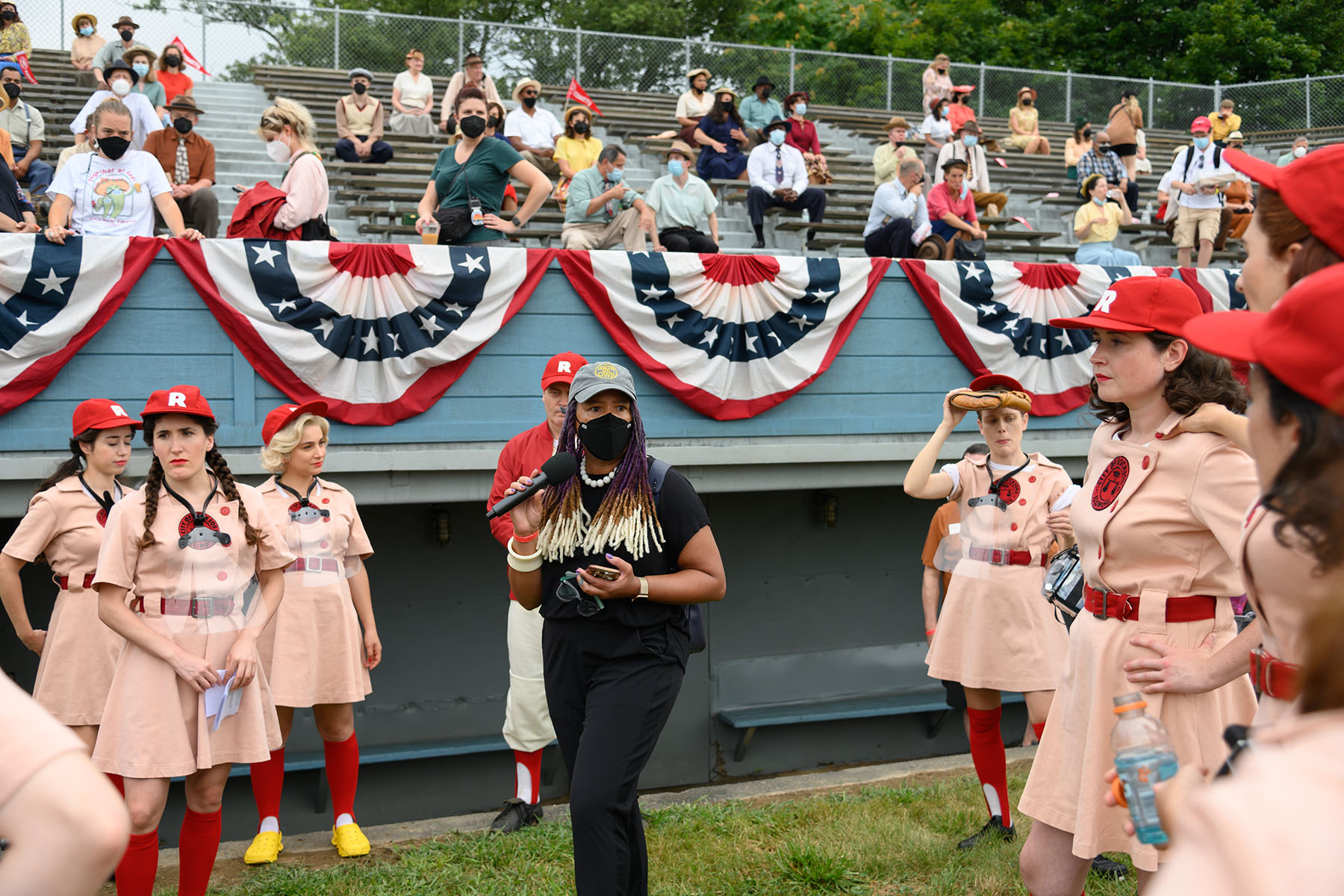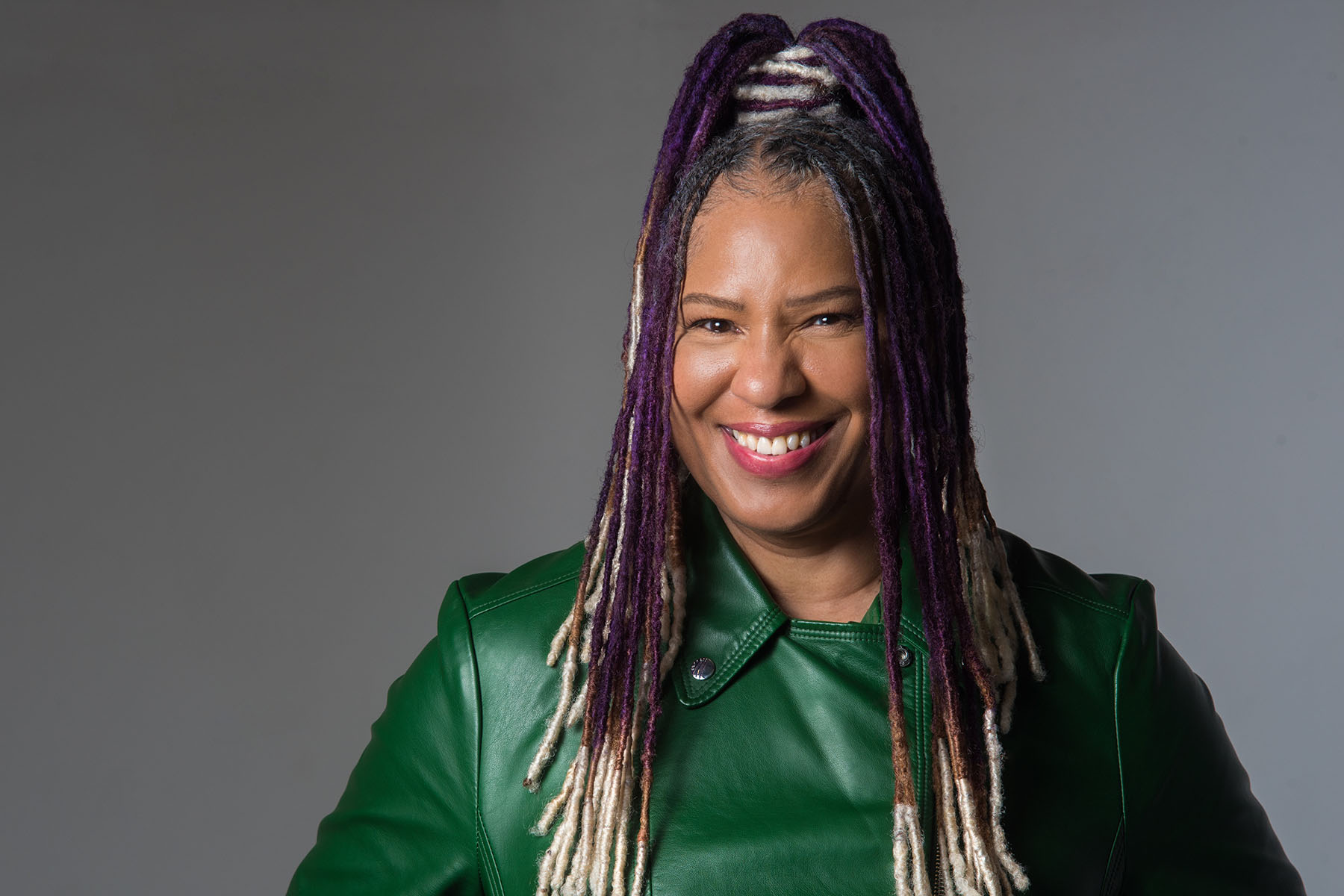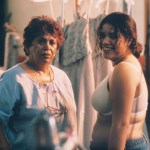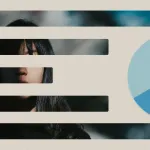This Black History Month, we’re telling the untold stories of women, women of color and LGBTQ+ people. Subscribe to our daily newsletter.
Ayoka Chenzira has perfected the art of adapting. For more than 40 years, she has created films that span different genres and media. She’s a writer, producer, director and a self-taught stop motion animator. In an industry that for many years either ignored or exploited Black women, she built a name for herself as an independent creator, developing, fundraising and promoting her work.
In 2018, Chenzira received a call from writer and director Ava DuVernay, who invited her to direct episodes of “Queen Sugar,” a critically acclaimed show created by DuVernay, with Oprah Winfrey as an executive producer. That opportunity opened a new door into the television world. Chenzira has since directed episodes of Amazon Prime’s “A League of Their Own,” the FX mini-series “Kindred” and others.
Her 1984 animated film “Hair Piece: A Film for Nappy Headed People” was added to the National Film Registry in 2018. A year later, the Academy of Motion Picture Arts & Sciences began to restore her films to maintain its visual quality.
As part of our Black History Month coverage, Chenzira spoke with The 19th to discuss the challenges and joys of her career, and her thoughts on the current state of diversity in film and television.
This interview has been edited for length and clarity.
Candice Norwood: Growing up you had a lot of exposure to different art forms: dance, music, etc. Have these influenced your work in filmmaking?
Ayoka Chenzira: The short answer is, yes. I was raised by my mom who had divorced my father, and so I was basically raised by a single woman who was very interested in the arts. And so I got a lot of exposure to the things that she was interested in. At a very early age, I was taken to museums, and opera and various kinds of concerts and dance concerts, in part because that was her interest.
She was also a really big fan of the movies. I think we went to the movies every week. My mom also made really beautiful clothes. She would take things that she saw in films as inspiration and redesign them. So I think it was a very unusual way for a Black girl in the city to grow up.
Your filmmaking experience has primarily been in the independent space. Is that a direction you decided to go intentionally for creative freedom, or is it something you had to do in order to break into the industry at that time?
Just to give you some context, I went to film school in the early ‘70s. And at that time, there were only four Black students in the program. One was in radio, one was in television, and then two of us were in film. So you have a major institution, but you only have four Black students in a program. And we studied all of the traditional Hollywood filmmaking, but we also studied international cinema, which I was very inspired by.
But it was very clear that people didn’t want to work on our films. They thought they weren’t going to get the films into Hollywood. And so the message was sent, I think by both faculty and my fellow students, that there was not an interest in the stories that were executed by Black talent on the screen, or by a Black director. That message came through very clearly.
And also, just in looking at the history of cinema, American cinema in particular, there weren’t a lot of Black and Brown faces. Even though, at this time, Blaxploitation films are just starting to creep in a little bit. So that was a point of reference for a lot of the filmmakers, but that’s also something I wasn’t particularly interested in. So I think at a very early age, probably around 19, I figured out that if I wanted to participate in this art form that I really dearly loved, then I was going to have to figure out how to carve out the paths for myself.
When you look back on your career, how do you feel about having to navigate the independent side of things?
I think your life is your life, and if you go around thinking, ‘I wish I could have or should have,’ then you’re probably going to have a very sad life. The career path that I chose, I think, aligned with my interests. I had a chance to experiment, which is something that you don’t get to do when you work in corporate environments.
I met colleagues, many of them to this day are very close friends, who I probably would not have met if I were in that corporate environment. And I got to talk about the things that I was interested in and wanted to talk about. So, I don’t have any longing or regret. In fact, if I think about my career and my life — which are very much aligned — it all makes sense to me.
How did you maintain confidence in yourself and your work even during times when you were not receiving external support or validation from the film industry?
I would say that it goes back to my mother. She was a very, very unusual spirit. I’ve already told you about my mom’s unique clothes, so the best example I can give you is that up until the age of 75, my mother rode a bicycle down the main street of Philadelphia, which is called Broad Street, in flowing dresses, and high heels. So this is the image that I had for most of my life.
This is an image that reminds me of somebody who is fearless, unafraid, unapologetic, and doesn’t really care a whole lot about what other people think about her. So this is my incubator. When you see that enough in your life, it builds up and it structures you in a particular way. So at a very early age I did not struggle with self esteem, or having people’s responses to my work sway me from what I thought I wanted to do as a maker.

I’m really struck by the different genres and forms of media that you’ve used in your films over the years. How do you decide what would be the best format to tell a particular story?
So every story that comes to me or that I develop, brings with it the question: “What would be the best way to tell this story?” So, for example, if I look at my animated film “Hair Piece: A Film for Nappy Headed People,” the last thing I wanted to do in bringing that satirical work to light was to feel like the hair police. I didn’t want to be telling Black women: “This is how you should wear your hair.”
And so that’s why it’s not done as a dramatic piece with real life people. The animation kind of supports the satirical tone of the story, and I think that leaves it more open for people to engage in meaningful and thoughtful conversation without feeling like they have somehow been attacked.
After you had worked independently in film for decades, you received a call from Ava DuVernay in 2018 inviting you to direct episodes of her show “Queen Sugar.” What was working on that set like for you?
Truthfully, all my friends told me that I was going to hate television because it’s one thing working as an independent filmmaker, where you are literally doing everything in terms of all the hiring, raising money, writing the scripts, getting the distribution deal, getting it into a film festival, etc. Television is collaboration in a very, very different way, and there’s also a hierarchy. And so, most of my friends thought I was not going to like that at all.
Before I went to New Orleans for filming there was an opportunity to talk with some of the executives of the show, who were really kind and generous and extraordinary. And when I arrived in New Orleans, it was just so welcoming and supportive. What I loved was the collaboration and how everybody working on that show was bringing their A-game and trying to get it to be the absolute best it could be. So that was my introduction into television, and I’ve been directing television ever since.
Ava DuVernay made a point to hire women directors to direct all the episodes of “Queen Sugar.” This included a number of women who had never directed television before. Do you think the intention she demonstrated in her hiring says anything about the so-called “pipeline problem” for expanding diversity in the industry?
Television, for most of us, was not only a closed door, but there were armed guards and explosives all around it. There was no entry point. It was one of those situations where a lot of corporate environments say, “We can’t hire you because you don’t have the experience.” And you can’t get the experience because you don’t have the experience for them to hire you.
So, it’s a chicken and egg game that has been played for so long, and it’s actually played out. A lot of people, while they may not specifically have television experience, they have storytelling experience. And once you understand how to do certain things, it’s really not rocket science. If you look at the track record, we have not only been kept out, but it appears to be we’ve been intentionally kept out. I’m one of those people who thinks that you can tell a lot by what you see, and you can also tell a lot by what is absent. So, how come we haven’t been at the table?
And of course now, so many of the women who were hired for that show, they have been working nonstop and creating exquisite, wonderful work.
How do you feel about the current state of things in terms of representation and access to opportunities for Black creators in film and television? On the one hand you have shows like Issa Rae’s “Insecure” and Quinta Brunson’s “Abbott Elementary” that have received a lot of critical acclaim and popularity, but there has been a lot of conversation about Black-created shows being canceled recently.
So first of all, the business is hard. It’s really hard, unless you are coming from royalty, or a particular pedigree in the industry. And then when you add the voices and the visions of people of color, it’s even harder. Remember, there are not a whole lot of people of color working in film and television. Particularly when we look at television, there’s just a small handful of shows that are doing the heavy lifting.
We’ve also just kind of come out of a strike last year, and there’s a lot of shuffling of the cards and shuffling of the deck from a business standpoint. So it’s really hard. Unless you have a tough skin, it will be really difficult for you. I don’t think we’ve really even cracked open the door in a big way yet in terms of the stories of people of color and the potential of storytelling by Black creatives.







